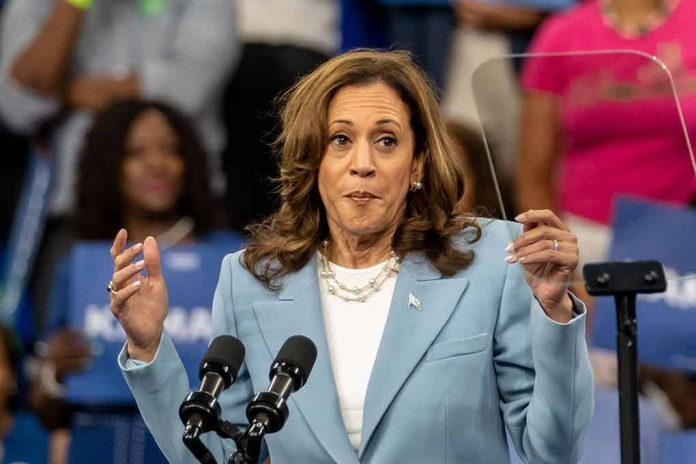
Kamala Harris’s evolving stance on the Senate filibuster seeks to codify Roe v. Wade, marking a significant shift from her previous support for the rule’s preservation.
At a Glance
- Vice President Harris supports eliminating the Senate filibuster to codify Roe v. Wade.
- Harris’ stance aims to distinguish her from former President Trump on abortion.
- Senate Majority Leader Chuck Schumer indicated he might consider eliminating the filibuster for abortion access votes.
- Manchin and Sinema reaffirmed their positions in defending the filibuster after Harris’ remarks.
- Sen. Bernie Sanders is open to an exception for abortion rights concerning the filibuster.
A Shift in Harris’s Filibuster Stance
Vice President Kamala Harris called for abolishing the Senate filibuster to codify Roe v. Wade into federal law. Harris’s position, revealed during an interview with Wisconsin Public Radio, is a notable shift from her 2017 stance where she joined other senators to defend the filibuster as vital for sustaining extended debate in the Senate.
This shift not only highlights the evolution of her political strategy but also aligns with her broader progressive policy goals. Harris’s advocacy for filibuster reform previously extended to voting rights and now incorporates reproductive rights, showcasing her response to contemporary legislative urgencies.
Kamala Harris supports eliminating filibuster to reinstate abortion rights from Roe v. Wade https://t.co/1dhyFAlFRu via @RebeccaMorin_
— Joey Garrison (@joeygarrison) September 24, 2024
Key Democratic Reactions
Senate Majority Leader Chuck Schumer signaled potential filibuster elimination for abortion access votes if Democrats retain the majority. However, divergent views persist within the party. Senators Joe Manchin and Kyrsten Sinema, staunch defenders of the filibuster, reaffirmed their stance following Harris’s remarks. Manchin emphasized the filibuster’s importance for democracy and bipartisan cooperation, while Sinema cautioned it could open doors to future nationwide abortion bans.
“She knows the filibuster is the Holy Grail of democracy. It’s the only thing that keeps us talking and working together.” – Manchin
Senator Bernie Sanders, traditionally skeptical of eliminating the filibuster, expressed openness to an exception for abortion rights. This dynamic within the Democratic Party reflects the complex and evolving landscape of legislative priorities and rules. President Biden has also supported changing filibuster rules to pass a federal law codifying Roe after the Supreme Court’s 2022 overturning of the decision.
🚨 NEWS: Kamala Harris says that as president she would end the 60-vote Senate filibuster to codify Roe v. Wade.
However, when given the chance to buck decorum to advance progressive policy in the past, Harris declined: https://t.co/pxKPiMmYzW pic.twitter.com/K3GMA2wcxP
— The Lever (@LeverNews) September 24, 2024
Historical Context and Potential Impact
Historically, the filibuster rule has seen significant changes since its inception in 1789, with notable amendments in 1917, 1975, 2013, and 2017. The current requirement of 60 Senate votes to end debates aims to prevent slim majorities from enacting sweeping reforms. Harris’s 2017 support for preserving the filibuster, coupled with her current advocacy for its elimination, underscores a political shift driven by urgent legislative challenges.
Senator Tom Cotton criticized Harris, suggesting her stance renders her word “meaningless.” The internal Democratic debate over the filibuster could significantly impact future legislation, particularly regarding abortion rights and broader progressive policies. Harris’s position remains a key element of her campaign, emphasizing reproductive freedom and distinguishing her approach from her political opponents.
Sources:
- Harris backs eliminating filibuster to codify Roe v. Wade
- Kamala Harris wants to end filibuster to push Roe v. Wade abortion rights through Congress







